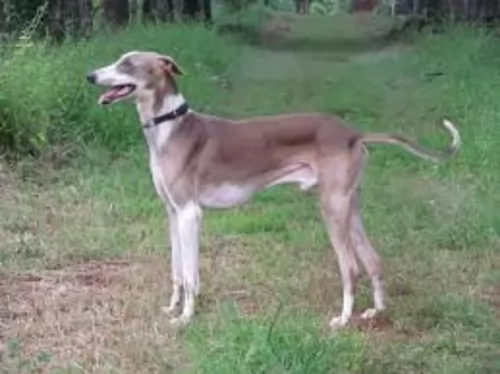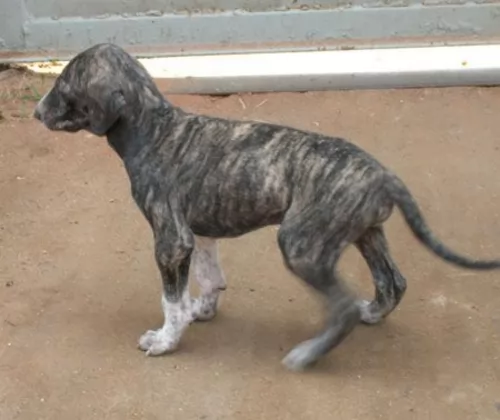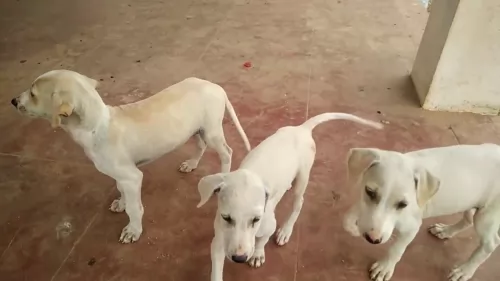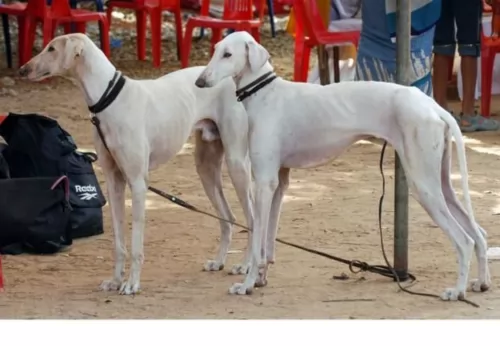 Petzlover
PetzloverBlue Paul Terrier is originated from United Kingdom but Mudhol Hound is originated from India. Blue Paul Terrier may grow 16 cm / 6 inches shorter than Mudhol Hound. Both Blue Paul Terrier and Mudhol Hound are having almost same weight. Both Blue Paul Terrier and Mudhol Hound has almost same life span. Both Blue Paul Terrier and Mudhol Hound has almost same litter size. Blue Paul Terrier requires Low Maintenance. But Mudhol Hound requires Moderate Maintenance
Known also as the Scottish Bull Terrier, the Blue Poll or the Blue Poll Bulldog, the Blue Paul Terrier’s origins, as with many unusual dog breeds, are still not known precisely. However they do appear to have been bred with Staffies at some point and appear to have slowly transformed into the Staffie or Pit Bull as we know them today.
There doesn’t seem to be much documentation on the dog’s origins, making many stories of its origins to be looked upon as folklore. It seems as if the dog originated out of Scotland. The name ‘Paul’ is included in the name simply because it is believed that John Paul Jones, who was a sailor, brought the dog to the USA in 1777.
Because this dog has superb fighting skills, it was introduced as part of Staffordshire Bull Terrier breeding in the early 19th century. It is believed that the first dogs came with English immigrants to the United Stated in the middle of the 19th century. At some time, the dog became extinct, but dates of this time can’t be established.
 This seems to be the breed of many names. The Mudhol Hound comes from India and has been called the Caravan Hound, the Pashmi, the Karvanit, the Karwaani and the Pisuri Hound. Like so many other Indian breeds, the Mudhol Hound bears a strong look of the Greyhound. He is a sight hound and as such is lean and fast. He is ancient, healthy and loves his people.
This seems to be the breed of many names. The Mudhol Hound comes from India and has been called the Caravan Hound, the Pashmi, the Karvanit, the Karwaani and the Pisuri Hound. Like so many other Indian breeds, the Mudhol Hound bears a strong look of the Greyhound. He is a sight hound and as such is lean and fast. He is ancient, healthy and loves his people.
The ancestors of the Mudhol include the hounds bred by the tribes of Bedar near Mudhol and Halagali. In Maharashtra the Maratha warriors were also breeding hounds which are included in the Mudhol Hound lineage. It is believed that there is Tazi and Saluki heritage in the Mudhol as well.
All of these Indian hounds were good at guarding, hunting and as companions. Then the King of Mudhol began to breed them specially for hunting and succeeded in developing a sleek, slender dog. The King of England at the time, George V, was so impressed he dubbed them the Hounds of Mudhol.
The Mudhol Hound hunts rabbits and other small animals with their incredible sight. No matter if the breed was on a postage stamp in 2005 and is a great family companion, it is first and foremost a working dog. He was specifically bred for the tough working conditions in the mountains of India. They are courageous, loyal and graceful. They are committed to their people but a little standoffish with anyone else and make good guard dogs.
They were used by the Indian Army as border protection and surveillance dogs. They use them for testing of their veterinary corps. They have been deployed by the Army in Kashmir and Jammu in 2017, just as they were centuries ago. They were effective at taking down soldiers and horses alike.
They were also chosen for breeding at the Canine Research and Information Centre, part of the Karnataka Veterinary, Animal and Fisheries Sciences University in Bidar. With a very high prey drive they can get along with other dogs their size but cannot be trusted with smaller pets.
The Indian National Kennel Club lists them as the Mudhol Hound while the Kennel Club of India recognizes them as the Caravan Hound.
The Blue Paul Terrier was a smooth coated, medium sized dog. His coat was mostly dark blue but this sometimes varied to red or brindle. He was a muscled and well built dog, much like our pit bull terriers. He weighed about 20 to 25kg kg, measuring up to 56cm at the withers. He had a broad chest, large head with small cropped ears and a tail that was set low. He is a dog that always stood strongly on his legs. It seems as if he had an aggressive nature as they were used by local dog fighters.
There is not much information on the temperament of the Blue Paul Terrier, but we can assume, that because he was a Terrier, he would have been full of character and self confidence. Most Terriers don’t actively look for a fight, but will certainly get into a fight if provoked. Aggressive by nature and a fighter, the Blue Paul Terrier possibly had some Staffordshire Bull Terrier in him, so his temperament would be that of a fighter.
He may have been able to live peacefully with children and other dogs and cats in the home, but he would no doubt have had to be raised from a puppy in such a household. Stubborn and headstrong, he would require a firm owner who could take charge of him and training would have been imperative for such a dog.
 The Mudhol Hound is a good looking sight hound. Slender, sleek, muscular. They have narrow, long heads with a muzzle that tapers. They have long and powerful jaws with a large black nose. Their eyes are oval, large and brown with a look that pierces, and they have long, muscular, and clean shoulders. The legs are straight, long and strong with a broad, muscular, long back. Like most sight hounds when you seen them coming at you straight on, they have the appearance of being one dimensional.
The Mudhol Hound is a good looking sight hound. Slender, sleek, muscular. They have narrow, long heads with a muzzle that tapers. They have long and powerful jaws with a large black nose. Their eyes are oval, large and brown with a look that pierces, and they have long, muscular, and clean shoulders. The legs are straight, long and strong with a broad, muscular, long back. Like most sight hounds when you seen them coming at you straight on, they have the appearance of being one dimensional.
There are two types of coat and many acceptable colors. The coat can be silky on the tail, legs and ears or it can be completely smooth from head to toe. The coat can be grey, black, cream, red, fallow, and fawn. It can also be one of these colors and a small amount of shite blended it.
Nobody is quite certain what the Blue Paul Terrier was like. He definitely seemed to be a mix of Pit Bull and Staffie – the same compact, muscular build with a look that speaks of confidence and boldness.
Perhaps if the Blue Paul Terrier wasn’t used for fighting, he might well have made a good pet with training and socialization. Nobody really knows. Maybe he was so aggressive that when dog fighting didn’t work out, and it was discovered that he wasn't really pet-material, nobody bothered when the breed went into extinction. That's the thing with Blue Paul Terriers, nobody is really certain about what they were really like.
The Blue Paul Terrier Health was generally a healthy dog, but he would no doubt have had the same common dog ailments that most dog breeds have to contend with. All those years ago, when the Blue Paul Terrier was ill, his owner no doubt would have taken him to see the veterinarian for a full screening.
Just like with other dog breeds, he would have been watched for hip dysplasia , ticks and fleas, cataracts and skin infections. It is possible that in those days, owners of the Blue Paul Terrier weren’t aware of how plaque could cause dental problems or gum disease.
 Like so many of the old breeds raised in a lot of isolation, the Mudhol is a very healthy breed. There are no genetic illnesses and they have a long line of dogs able to deal with the weather in India and avoid any sickness. However, they do have a few conditions they are prone to.
Like so many of the old breeds raised in a lot of isolation, the Mudhol is a very healthy breed. There are no genetic illnesses and they have a long line of dogs able to deal with the weather in India and avoid any sickness. However, they do have a few conditions they are prone to.
Because these dogs were used in fighting, it is a breed that no doubt would have required plenty of exercise and mental stimulation to keep him fighting fit. No doubt he would have received a high quality food to build up his strength and stamina. Because he was no doubt a high energy dog, his owners would have had to give him nutritious food and ensured fresh, clean water for him.
The Blue Paul Terrier had a short, smooth coat, so they were no doubt low maintenance dogs who received a brush down every now and then to remove his loose hair.
 The Mudhol puppy needs a high quality dry food. They should eat three to four times a day in smaller portions. A total of 3 to 3.5 cups per day.
The Mudhol puppy needs a high quality dry food. They should eat three to four times a day in smaller portions. A total of 3 to 3.5 cups per day.
The adult Mudhol should eat about two and a half cups of high quality dry food twice a day. Do not overfeed the Mudhol and don’t let him run right after eating.
Outstanding speed and stamina
This is a high energy, active dog that needs a lot of space and exercise. She needs to be able to run freely as long as she wants at least a couple times a day. He has incredible endurance and a very high prey drive. They must be in a fenced area unless on a leash. They are great at lure coursing, fly ball and agility.